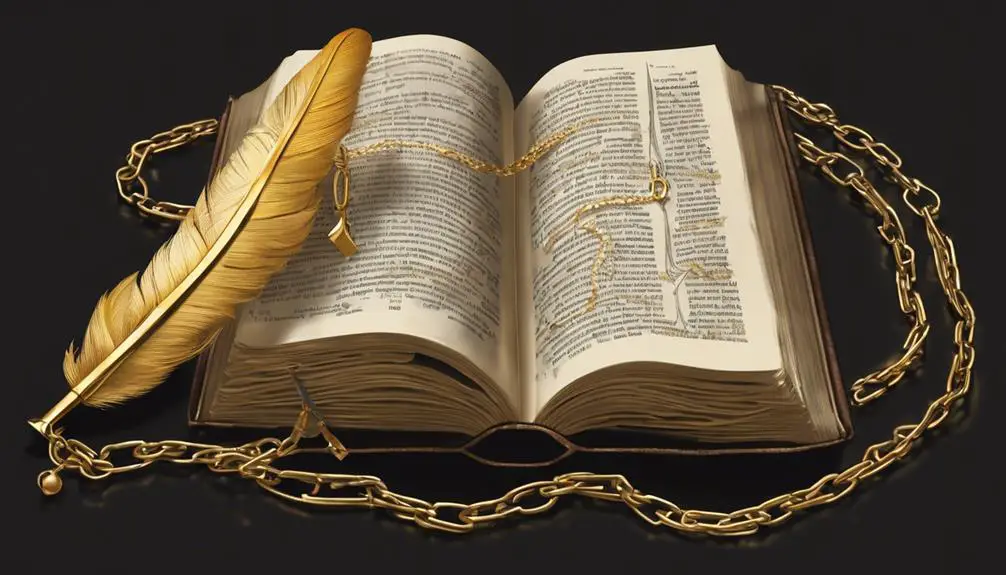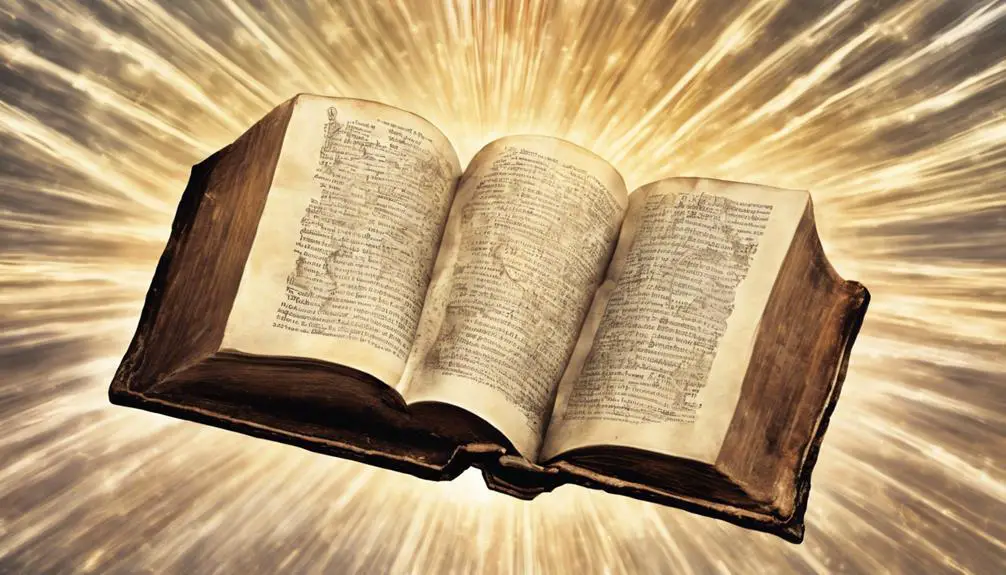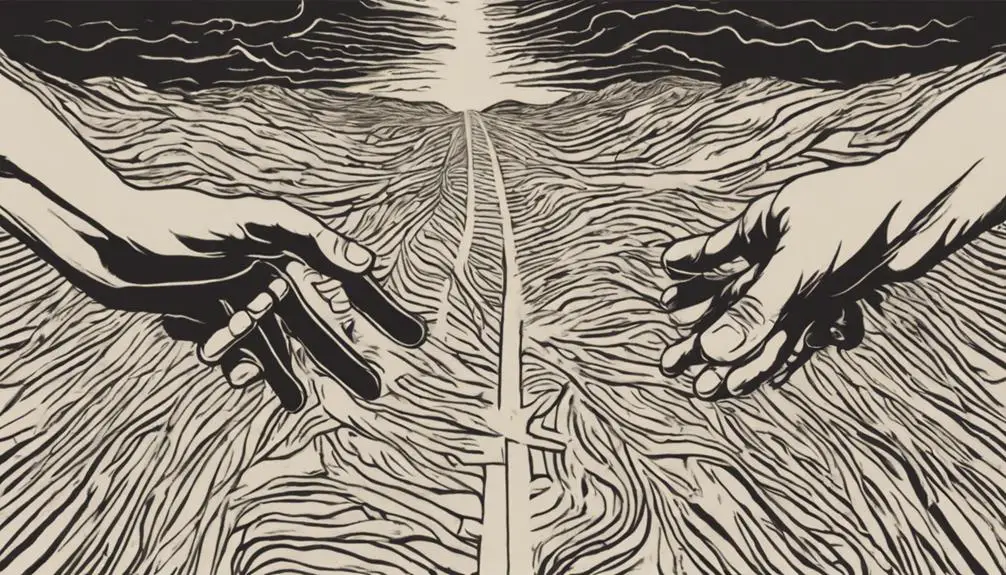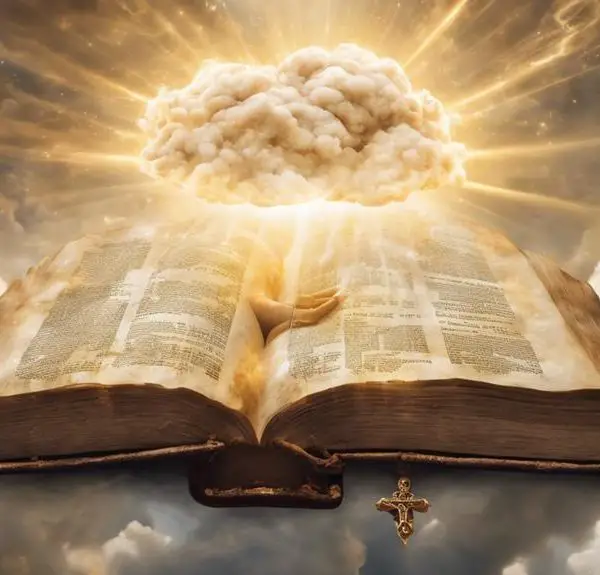Balancing biblical predestination and human free will, this piece invites you to explore the intriguing contradiction that shapes our spiritual journey.

Predestination in the Bible Vs Free Will
As you navigate through life's unpredictable currents, have you ever pondered the cosmic tug-of-war between predestination and free will? Scripture seems to suggest a divine blueprint, yet it also champions the human ability to choose.
So, where's the line between God's foreordained plan and your personal freedom? Do these concepts peacefully coexist, or are they at loggerheads?
As you wrestle with these questions, the depth and breadth of this intriguing dichotomy might surprise you.
Let's explore, shall we?
Key Takeaways
- Predestination, based on the Bible, asserts that all events are divinely ordained, but sparks controversy on human fate and God's control.
- Free will upholds human autonomy, asserting that divine influence doesn't negate the freedom to make choices with consequences.
- Scriptural evidence supports both predestination and free will, striking a balance between divine sovereignty and human accountability.
- The concepts of predestination and free will may seemingly contradict but can coexist, shaping our understanding of God and our relationship with Him.
Understanding Predestination Concept

To fully grasp the concept of predestination, you'll need to delve into the theological basis behind this complex belief. Essentially, it's the doctrine that all events have been willed by God, usually with reference to the eventual fate of the individual soul. In wrestling with predestination, you're engaging with two key concepts: Divine sovereignty and human responsibility.
Divine sovereignty refers to God's complete and absolute rule over all of Creation. It's the belief that God is in control of every single event that occurs, from the mundane to the significant. Nothing happens outside of His knowledge and control.
On the other hand, human responsibility emphasizes the role of free will. It's the idea that you're responsible for your actions and their consequences, despite the overarching divine sovereignty. It's important to understand that these two aren't mutually exclusive but rather intertwined in a way that's difficult to comprehend.
In essence, predestination is about balance. It's about recognizing God's absolute authority, while also acknowledging our part in the grand scheme of things. It's a paradox that challenges us to think deeply about our faith, our choices, and our place in the universe.
Biblical References to Predestination

Having wrapped your mind around the concept of predestination, let's now explore its presence and interpretation in the Bible. Predestination's origin can be traced back to various verses in the New Testament. For instance, Romans 8:29-30 states that those God foreknew, He also predestined to conform to the image of His Son. Ephesians 1:4-5, on the other hand, speaks of God choosing us in Him before the foundation of the world, predestining us for adoption as sons.
However, the interpretation of these texts has sparked some of the most heated predestination controversies. Some scholars argue the verses suggest a divine plan where God determines everything, including human fate. They view predestination as God's sovereign control over all events, including salvation. Others, meanwhile, understand these verses to mean that God merely knows beforehand who'll choose to follow Him – not that He predetermines it.
The Principle of Free Will

In contrast to predestination, the principle of free will asserts that individuals have the power to make choices that are genuinely their own and not predetermined by divine will. This perspective is rooted in the belief that human beings are autonomous entities, capable of willful disobedience and independent decision-making, regardless of divine influence.
- Willful Disobedience: Free will implies that you're capable of disobedience. When you choose to deviate from divine commandments, it's not a preordained act but your personal decision.
- Divine Influence: While God's influence and guidance are present, it doesn't strip away your freedom to choose. Even with divine influence, you have the liberty to accept or reject divine commands.
- Consequence of Actions: Free will carries the burden of consequences. Your choices, whether in alignment with divine will or not, produce outcomes that you're responsible for.
In essence, the principle of free will recognizes your ability to shape your own destiny. It doesn't negate the presence of divine influence, but it does affirm your capacity for self-determination. This principle underscores the significance of personal responsibility, making each decision an opportunity for spiritual growth or wilful disobedience.
Scriptural Evidence for Free Will

Let's delve into the Bible, where numerous passages provide compelling evidence of free will in its teachings. Scriptures like Deuteronomy 30:19 and Joshua 24:15 explicitly state that individuals have the power to choose, emphasizing human accountability.
Scripture |
Emphasis on Free Will |
|---|---|
Deuteronomy 30:19 |
"I have set before you life and death, blessing and cursing: therefore choose life, that both thou and thy seed may live." |
Joshua 24:15 |
"But if serving the LORD seems undesirable to you, then choose for yourselves this day whom you will serve." |
Revelation 3:20 |
"Here I am! I stand at the door and knock. If anyone hears my voice and opens the door, I will come in and eat with that person, and they with me." |
John 7:17 |
"Anyone who chooses to do the will of God will find out whether my teaching comes from God or whether I speak on my own." |
These verses affirm the balance between Divine Sovereignty and Human Free Will. They suggest that while God maintains ultimate control, He allows for human freedom, thereby enforcing human accountability. It's clear then, that the Bible supports the concept of free will.
Comparing Predestination and Free Will

Now, when you delve into a comparison of predestination and free will, you'll find fascinating contrasts and overlaps within biblical texts. You'll notice that the two concepts might seem at odds, but they also complement each other in some respects.
In considering the Divine Sovereignty debate, you'll find:
- Predestination asserts that God, in his sovereignty, preordains certain events or outcomes. This belief is often associated with the Calvinist Perspective, which emphasizes God's complete authority and control over creation.
- Free will, on the other hand, suggests that humans have the ability to choose and make decisions independently. It's an affirmation of human autonomy and responsibility.
- The overlap lies in the belief that, despite predestination, humans are still free to make choices. This paradox is often reconciled by stating that God's foreknowledge of events doesn't necessarily restrict human freedom.
While some might feel these concepts are mutually exclusive, a closer analysis reveals they might coexist in a divine mystery. Remember, these aren't just academic or theological debates. They shape our understanding of God, our relationship with Him, and how we live our lives. So be open-minded, explore different perspectives, and continue to seek understanding.
Frequently Asked Questions
How Does the Concept of Predestination Relate to Other Religions Outside of Christianity?
You might find predestination in other religions too. For instance, in Islam, it's known as Qadar, where everything that happens is preordained.
Similarly, Hinduism's Karma Doctrine implies a form of predestination, where your actions determine your future.
However, these concepts don't negate free will entirely. It's more of a complex interplay between predetermined fate and personal choices.
Are There Any Scientific Theories That Support the Concept of Predestination or Free Will?
From a neuroscience perspective, you might argue that our choices are predetermined by our brain chemistry. However, quantum physics insights suggest that randomness and uncertainty are fundamental aspects of nature. So, it's not clear-cut.
Science doesn't definitively support either predestination or free will, but presents arguments for both. Ultimately, it's a complex, ongoing debate that intertwines science, philosophy, and personal belief.
How Do Different Christian Denominations Interpret Predestination and Free Will Differently?
You'll find denominational differences in how Christian groups interpret predestination and free will. For instance, Catholics lean more towards free will, emphasizing human choice.
Conversely, Calvinists stress predestination, asserting God's sovereign control over salvation. These interpretation variations highlight the complexity within Christianity's theological thought.
It's a rich tapestry of beliefs, reflecting diverse perspectives on divine sovereignty and human autonomy.
How Do Predestination and Free Will Concepts Affect Ethical and Moral Decision-Making?
Predestination influence and free will impact your ethical and moral decision-making significantly.
If you believe in predestination, you might feel your choices are predetermined, affecting your responsibility.
On the other hand, if you subscribe to free will, you'll likely feel accountable for your actions, which can shape your ethical and moral decisions.
Hence, your belief can either empower or limit your ethical decision-making.
How Have Historical Events Been Influenced by the Belief in Predestination and Free Will?
Historical events have been significantly shaped by the belief in predestination and free will.
You can see predestination's societal impact in the rise of fatalistic attitudes and the abdication of personal responsibility. Furthermore, the concept of free will has been instrumental in politics, fueling movements for democracy and individual rights.
These beliefs have influenced societies, creating a blend of deterministic and self-determining ideologies.
Conclusion
In sum, the Bible provides intriguing perspectives on both predestination and free will. It's not a black-and-white issue, but a fascinating blend of divine sovereignty and human freedom.
Balancing these two principles can be complex, but it's essential in understanding the nature of faith and human responsibility. Ultimately, whether you lean more towards predestination or free will, it's crucial to remember God's omnipotence and our role in our spiritual journeys.



Sign up